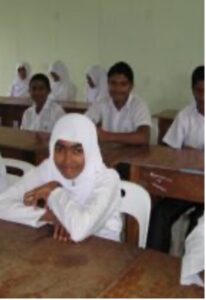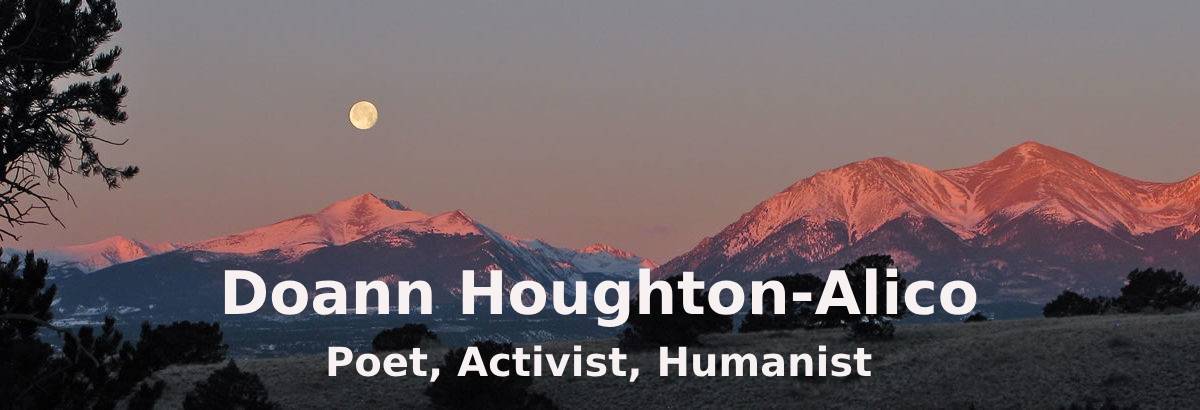The wind was undisciplined, coming from the wrong direction, not following its usual pattern, so the anchorage at Uligan in the north end of the Maldives was exceptionally rolly. Because of the conditions, we didn’t even put the dinghy in the water for five days.

The officials came out to the boat to check us in so it wasn’t necessary to go ashore for that. Customs, Immigration, and Health: three neatly uniformed middle-aged men, moustaches carefully trimmed, trouser creases ruler-straight came aboard. Their manner matched their appearance: words politely trimmed, paperwork ruler-straight. Certainly there was no hint at baksheesh or requests for tobacco or alcohol. Many signatures, many lists of our passport numbers, places of birth, yacht documentation, but everything efficiently, pleasantly completed. At that point we’d experienced some twenty-two check-ins; Uligan clearly topped the list as the easiest and most comfortable.
I spent a couple of those rolly days at anchor, scrubbing the boat by hand to remove the grit accumulated from the cement plant next to our earlier
anchorage at Galle, Sri Lanka. Because of the wind and the waves it created, I wasn’t tempted to go snorkeling at first. When I finally did, I found an abundance of living coral and an equally colorful diversity of reef fish; then I went every day. If I’m not sailing on the water, I would just as soon be in it.
The Maldives, an Islamic country, is most intent on protecting its heritage. Any gifts outsiders might have for anyone on the island must be approved by the Customs official. I did have gifts for the school and made arrangements to visit this official when we went ashore. He readily approved my gifts and my offer to work with the students on their English. In fact, when we departed, he called me on the radio to wish us a safe voyage and to thank me for our visit. While on shore we needed a guide—more like a chaperone—when walking around the village and had to state our intentions.
if venturing for walks elsewhere. Not that we couldn’t go where we wanted, as long as someone knew where and why. We felt like young teenagers again with parents on guard against any waywardness.
Uligan is fairly small—about three miles by one mile—so we couldn’t have gone very far anyway.
The little village was immaculate. It had a population of about three hundred, and those residents cleaned the island every week. The sand streets were used mostly for walking and a couple of electric carts, and were swept frequently by the women. The sturdy, whitewashed houses were built of coral rock and cement. They had a large wind-generator farm, provided by U.S. aid, that supplied about half their energy needs. Here, unlike Xcalak, it was maintained, probably by neatly dressed men with neatly trimmed beards and neatly organized tools.
Dress was clearly on the more conservative side, a tradition we were familiar with from other Islamic countries, and one we respected. Unlike many other Muslim countries we’ve visited, the Uligan women and girls were shy when I would meet them in the village. They wore traditional dress, but not veils.
There was a well-equipped school on the island that went through ninth grade and included a small computer lab. I spent about two hours with the ninth-grade English class one day. Rather than a formal lesson we used conversation. They asked many questions about our travels and the United States. One student, whom I nicknamed Mr. Question Man, aspired to be president of his country. Quite bright, he wanted to know how a man gets to become president of the United States. He liked to talk as well as question; I thought he would do well in politics.
The girls were shy at first in their spotless white hijabs, but once started, they asked many interesting questions: Why are you sailing around the world? What do girls do in the United States? Where are your children? Except for Mr. Question Man, the boys didn’t say much, except the usual fifteen-year-old boy questions: How fast can you go? What is your engine’s horsepower?
I left a book about Winston Churchill for Mr. Question Man, which was the closest I could come in my small, ever-changing boat library to anything political. For tenth- through twelfth-grade, the students went to another island. I was able to visit that school also, and it was extremely well-equipped with a large computer lab; biology, physics, and chemistry labs; and a library. Most of the teachers were from India. There was no university in the Maldives, but education was a high priority, and many students went on to university in India.
There was a local business called Sailor’s Choice, owned by the judge, but run by young Amaad and his crew, including Hussein, Hussen, and Asad, all of whom were most helpful and courteous. They arranged an excellent local meal for the cruisers, and a day trip to two other islands, including snorkeling and lunch that I enjoyed with some of the other cruisers.
Amaad and his team arranged for laundry and provisions, and if their little store didn’t have it, they took us around to try to find whatever we needed elsewhere. They delivered fuel to our boat, gave us a tour of the small town, answered all of our questions, and provided anything else we could think of.
This little island country with its ruler-straight procedures and cleanliness from clothes to streets seemed separate from the rest of the world, not only by water. I had the feeling that this protective net was meant to do just that, insulate them against global tides. With climate change and the height of the oceans increasing, this entire country with its highest point a mere eight feet above sea level will disappear from sight sometime in the future. For me, it was simply not possible to imagine these people integrating into the chaos that is India, their nearest neighbor. What changes will attack this culture, this country, that their protective net cannot withstand?
Wondering what the future held for Uligan was not foremost in our thoughts as we left this charming place that had provided us a respite. Now we were sailing on to Yemen, having to navigate Pirate Alley between Somalia and Yemen, clearly the most dangerous part of our voyage.
This is an excerpt from my book, Voice of a Voyage: Rediscovering the World During a Ten-year Circumnavigation, published by Sunstone Press, Santa Fe, New Mexico in 2014. It’s available in paperback and eBook and has 5-star ratings from Goodreads, Readers’ Favorite, and Amazon. If you’re interested in reading it, you may want to ask your library to purchase it, or if you do so yourself, I recommend your favorite independent bookstore or directly from the publisher, although it is available on Amazon.
